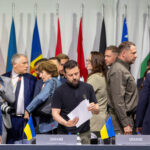In recent weeks, the question of why the United States actively defends Israel’s airspace but refrains from similar actions towards Ukraine has become the subject of serious discussions. While the U.S. has deployed anti-aircraft systems in Israel to protect from Iranian rockets, Ukraine continues to suffer daily attacks from Russian drones and missiles. This has caused outrage in Kyiv, where such actions are seen as double standards.
Ambiguous Foreign Policy
Ukrainian officials emphasize the need for equal protection of civilians in different parts of the world. The Ukrainian government has repeatedly reached out to allies requesting assistance in defending its airspace, similar to what is happening in Israel. However, the response from the U.S. and NATO remains cautious.
The main reason for this caution, according to Politico, lies in the differences between Russia and Iran. Russia is a nuclear state, and any direct intervention in a conflict with it could lead to serious escalation, even to nuclear confrontation. Consequently, shooting down Russian missiles over Ukraine could result in direct military conflict between the U.S. and Russia.
Nuclear Factor in International Relations
One of the key reasons why the U.S. is willing to take active actions in Israel but not in Ukraine is the absence of a nuclear threat from Iran. Although Iran has a developed nuclear program and has accumulated materials suitable for making nuclear weapons, it has not attempted to create the bomb itself. This allows the United States to act more boldly in the Middle East region, without fearing serious escalation.
On the other hand, in relations with Russia, the U.S. seeks to avoid any actions that could provoke a response from Moscow, especially considering that Russia possesses a significant nuclear arsenal. This fact makes the risks of any intervention much higher than in the case of Iran.
Assistance to Ukraine: from a Distance
Although Western partners do provide significant military assistance to Ukraine, it largely consists of arms deliveries and warning systems. For example, international partners often signal the movement of Russian bombers to firing positions in Ukraine. However, these actions are still indirect and do not involve active participation in shooting down missiles over Ukrainian territory.
Ukraine is urging Poland and Romania, NATO members, to intervene in air attacks at least in their airspace or over western regions of Ukraine. However, these countries are currently cautious about such actions, as it could lead to escalation of the conflict with Russia, which they are not prepared to permit without the support of the entire NATO alliance.
Why Does Israel Receive More Support?
Israel holds a strategically important position in US foreign policy. Decades of built military and political relationships allow Washington to more actively defend Israel and even deploy its missile defense systems directly on its territory. This significantly differs from the situation with Ukraine, where allies are not ready to deploy their forces due to fear of escalation with a nuclear state.
Ukraine remains on the periphery of this confrontation, and although it is supported with weapons and economic aid, there is no such active involvement as in the case of Israel. This creates an impression of double standards among many Ukrainians and causes disappointment in the insufficient support from Western partners.
Security Factor
The difference in approaches to Israel and Ukraine also raises questions about how the international community views countries with nuclear weapons. Russia, as a nuclear state, effectively receives more respect and cautious treatment for its actions. This sets a dangerous precedent for other countries that may seek to acquire nuclear weapons to secure a similar status.
This situation enhances concerns about the future of global security, as countries’ desire for a nuclear arsenal could undermine the system of international agreements on nuclear non-proliferation.
Conclusions
The issue of protecting Ukraine’s airspace remains one of the most acute in the current conflict with Russia. Although Western allies provide assistance, it is limited to indirect actions, which has drawn criticism from the Ukrainian government and public. The difference in approaches to Israel and Ukraine underscores how a country’s nuclear status can influence international politics and security.
This situation is a challenge for Ukraine, which is forced to seek alternative ways to strengthen its defense and diplomatic relations with Western partners.


